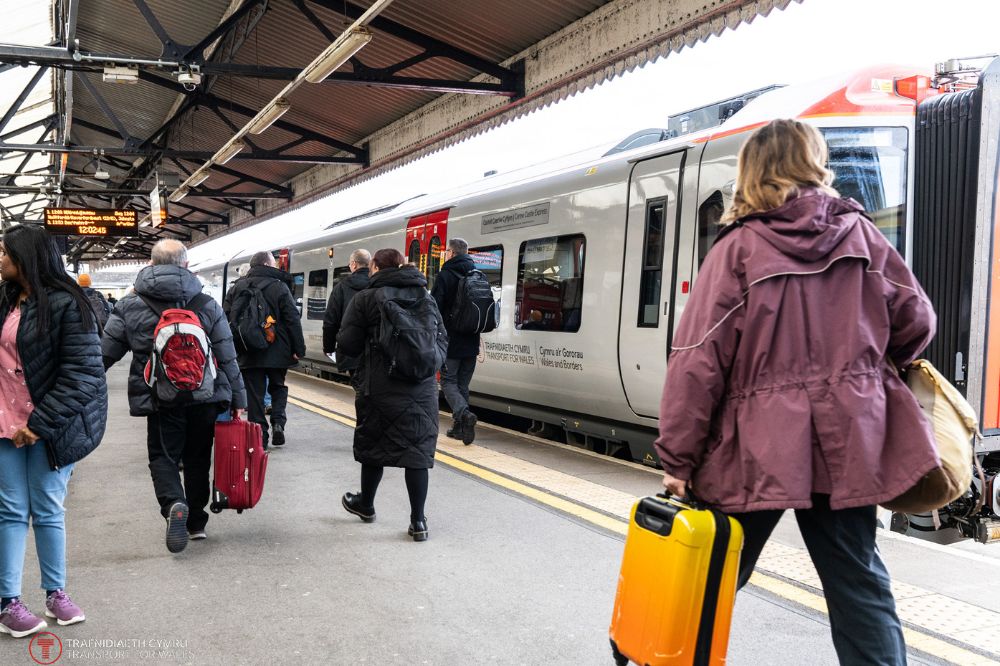Transport for Wales makes ‘tough decisions’ on timetables following changing rail demands

Transport for Wales (TfW) says it has had to make “tough decisions” on future timetables following a change in rail travel demands post-covid.
Following a comprehensive review of current rail demand and predicted future growth, TfW has developed a new long-term strategy.
The rail provider says it will better align with the new travel habits and requirements of customers, whilst becoming a “truly multimodal operator”.
As a result of the review some rail routes will see more services and longer trains with more seats, particularly during seasonal peaks.
Other routes will see slightly different calling patterns better targeted to current needs.
‘Tough decisions’
However, TfW says it has had to make some “tough decisions” to ensure it provides capacity where most needed, grows revenue and ultimately reduces public subsidy.
Some of the key changes include:
Running 87 more services on mainline routes than when TfW took over in 2018 and more carriages added to some busiest services to help meet growing demand.
Removing a small number of services that have very low passenger demand.
Providing extra capacity on popular summer routes.
Deferring some earlier-made commitments for more services on certain routes.
TfW remains committed and is continuing to deliver its £800 million investment into new trains for the whole of its network.
Review
Stakeholder feedback on current timetables, passenger numbers and close consideration of alternative travel options have all fed into the TfW review.
Colin Lea, Planning and Performance Director said: “We’ve completed our future timetable review. The proposed new timetables will provide us with more resilience in the winter period and meet changed travel demands post Covid.
“Nearly every service that TfW operates requires public subsidy, and as a responsible operator it’s imperative for TfW to balance the needs for a regular, robust and reliable service with available budgets to deliver value for taxpayers and more sustainable transport.”
TfW intend to deliver these timetables over the next few years.
Support our Nation today
For the price of a cup of coffee a month you can help us create an independent, not-for-profit, national news service for the people of Wales, by the people of Wales.







Sounds like an excuse to max out on profitable city routes whilst abandoning rural passengers whose alternative bus transport has also been decimated.
We need a Cymru Wledig/ Rural Wales Champion.
How do you come to that conclusion?
‘Removing a small number of services that have very low passenger demand’
and
‘Deferring some earlier-made commitments for more services on certain routes.’
…is management speak for further restrictions on low commercial value but essential services for areas that suffer poor transport connections.
Are these people who have to travel to GP, dentist and hospital appointments to be abandoned?
Not in a civilised society as I hope we aspire to be.
Much as it’s a shame to cut back, the proposals actually seem largely sensible and reasonable. For example, the extra trains added between Aberystwyth and Shrewsbury a few years back are still very, very quiet. It makes total sense to not waste fuel and staff to run these in the winter and instead redeploy the carriages to busier services.
It is more than “a shame” for people who rely on those trains to get to and from work, school, doctors and dental appointments, with no real option. People on this line now risk losing their employment because they can’t get to or from their place of work. Sadly, they can’t hibernate in the winter months. This is especially so on the Cambrian Line. Machynlleth to Pwllheli.
“tough decisions” – like deciding to run a few trains on time, to work to timetables, to have regard for their customers’ expectations having paid through the nose for trips that either run late or don’t happen at all.
The Westminster Government has under invested in Welsh railways by at least £3 billion in the last 20 years (and that ignores HS2) which has resulted in slower, lower frequency and hence capacity on rail lines and far higher costs for TfW and Welsh customers. If the conservatives would cough up that £3 billion it could make a big difference to Wales and TfW. I notice RT and Natasha are silent on the issue.
As usual blame Westminster, this is the only thing you can rely on the Welsh government to do consistently apart from blaming drunks for our 3rd world health service. The excuses are already being fabricated for the failure of the train services that will inevitably happen, due to our p!ss poor quality of government and management of services.
Full details of the changes are here:
https://news.tfw.wales/news/tfwannounce-future-plan-for-changing-rail-demands